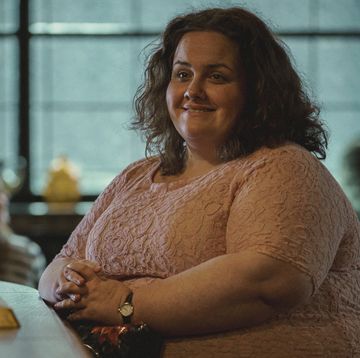This morning, Beyoncé posted two Instagrams calling attention to the racial unrest in Baltimore, Maryland. And it moved me because I’m a black American woman who remembers when England had to put out a few fires of its own.
I’ll never forget the day when the London riots reached its peak in 2011. I was sitting on the couch in a bit of a stupor, watching young people in face masks and tracksuits torch cars in the street on Sky News. They were in Hackney, 10 miles away from where I live, so not too close. But my friends and relatives back home in the States were worried and called to express concern. One friend saw a bigger problem brewing: "You know, America is next. Wait and see.”
And here we are, four years later. Same scene, different country. Or as one Tweet that’s currently making the rounds puts it: “Another day, another name, another hashtag.”
Mind you, the London riots weren’t about race. But the general sense of frustration and unrest among the city’s youth that defined those violent protests reminds me of what I’m seeing in America right now. Maybe you’ve scrolled through the images this week of young black men setting fires, smashing police cars, and lying in the street, protesting the brutal death of a 25-year-old named Freddie Gray while in police custody. Racism in the States is a deeply complicated issue that has a different meaning from what it does here in England. Freddie’s death from a broken neck and head injury while he was under arrest is the latest in an impossibly long list of black men and women who have been killed by the police; sending the message that black lives simply aren’t valued as much as their white counterparts are in America. That’s why you might have come across #blacklivesmatter on your Instagram or Twitter feed.
To the average Londoner, these might seem to be abstract causes from a distant country, which is why I’m writing this essay, really. I’d love to stop talking about race — a year ago I even made a decision to stop writing about it, I was that tired of the subject. But racism keeps happening. So here I am, with the clarity that sometimes only a glass of wine can bring, trying to unpack it all. Because though racism here in the UK is thankfully much more subtle than the aggressive, in-your-face variety that we’ve been seeing in the States lately, that doesn’t mean the problem isn't here too.
For the record, I’ve experienced the blatant and the subtle kind. There was the time a friend called me the N-word while playing (we were 6) in my middle class neighborhood in Virginia, for example, versus the time I was routinely mistaken for the receptionist at an office I once worked at in London (full of women), when in fact I was senior management. Because surely a woman who looks like me couldn’t be a boss, right? How about no.
“We have to come to terms with some hard truths about race and justice in America,’ Hillary Clinton said on Wednesday, just a week after she kicked off her election campaign. And for those who think Britain is immune, I say it’s a small step from a party like UKIP whipping up a storm against immigrants and immigration to something far more sinister.
Yes, we do have to come to terms with race on both sides of the Atlantic. But how does one turn names and hashtags into greater tolerance and equality? From gender equality to women’s rights, we’re no strangers to the power of a potent Tweet. But the real power lies in the action that happens after the message has gone viral. With that in mind, I think we can learn a few things from #blacklivesmatter.
For one, verbal conversation about race with actual people, in real life, is always a good thing. I’m not talking about a bad Starbucks experiment. But rather having the courage to talk about it during our daily chatter as candidly as we do what little North West is wearing — ideally with someone who is different from you. The subject doesn’t have to be this sensitive, no-go zone that makes black people exasperated and white people squeamish and terrified to say the wrong thing. I’m not afraid to use the terms white, black or mixed race, and don’t think anyone else should be. I’ve been in environments when people have awkwardly gone out of their way to avoid the language of race — but I think that’s exactly what we should be doing. As people, we generally want to discuss the issues that affect who we are, whether it be gender, race, age or weight. Black women and men want to be engaged in this issue. It feels isolating when I see my black peers rallying around the issues on social media, while everyone else remains frozen in silence, worried about which words to use or how not to offend.
So as long as joblessness for black, Asian and minority young people in Britain continues to spike (41,000 BAME youth face long-term unemployment, that’s a 50% rise vs. a 1% fall for white teens according to figures released by the Labour Party), we must continue examining it. We can’t not talk about it.
As the successful campaign to derail Protein World’s sexist Beach Body ads show, there's value in debating an issue, and keeping it on the table until it's been resolved. Chatter creates awareness, and awareness sparks action, which leads to change. #BringBackOurGirls is a great example of how keeping an issue on the table can help create change. There’s a reason why the hashtag keeps rolling around, and that's because more than 100 schoolgirls are still missing in Nigeria, prisoners of Boko Haram. Surely the campaign to publicise the problem helped light the fire under the asses of Nigerian authorities who managed to rescue nearly 300 women and young girls just this week. More than half of the original girls kidnapped are still missing, but it’s a start. It’s a reminder that their lives still matter for all of those who had forgotten.
But most importantly, crucial moments like this — whether it’s #blacklivesmatter or #eachbodysready — remind us that we all have the power to actually do something about it. How to do that? Start by talking to the people who are around you, removing the weirdness and the stigma around race. And when necessary, follow that up with more concrete social action to support organisations who are helping to promote greater awareness, tolerance and equality. Below is a short list to get you started.
NAACP, USA
Black Lives Matter, USA
American Civil Liberties Union, USA
Autograph, UK
Tweet your thoughts to us @ELLEUK
Kenya Hunt is the Editor-in-Chief of ELLE UK. Her career spans working for some of the world's most influential women’s titles on both sides of the Atlantic from her post-graduate days as an Assistant Editor at the seminal magazine, Jane, to her time as Deputy Editor of Grazia UK and ELLE UK. As the founder of R.O.O.M. Mentoring, she advocates for greater diversity within the fashion industry by providing a supportive network for some of the many talented aspiring designers, journalists and image makers of colour London has to offer. In 2021, she was recognised by The British Fashion Council for her work and given a Global Leader Of Change Award at its annual Fashion Awards. An American based in London, she lives south of the river with her husband and two sons. Her critically-acclaimed book, Girl: Essays on Black Womanhood (HarperCollins/HQ), is out now.












